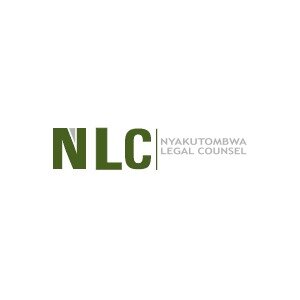Best Tax Increment Financing Lawyers in Zimbabwe
Share your needs with us, get contacted by law firms.
Free. Takes 2 min.
Or refine your search by selecting a city:
List of the best lawyers in Zimbabwe
About Tax Increment Financing Law in Zimbabwe
Tax Increment Financing (TIF) is a financial tool widely utilized in economic development efforts across the globe, including in Zimbabwe. It is designed to leverage the future gains in taxes to subsidize current improvements, typically in infrastructure and redevelopment projects within a designated area. In Zimbabwe, TIF aims to encourage urban renewal, attract private investment, and improve public infrastructure. Understanding the specific laws and regulations governing TIF in Zimbabwe is crucial for anyone participating in these projects, as compliance and strategic planning will determine the success of such initiatives.
Why You May Need a Lawyer
Engaging with Tax Increment Financing without legal expertise can lead to several challenges. Here are some common situations where legal help may be needed:
- Understanding Local Statutes: Navigating complex local regulations and compliance requirements can require legal guidance.
- Contract Negotiation: Legal professionals assist in the drafting and negotiation of contracts to ensure favorable terms.
- Dispute Resolution: In case of disagreements between stakeholders, a lawyer can help in mediation or arbitration.
- Due Diligence: Conducting thorough due diligence to assess investment risks and ensure legal viability.
- Litigation: In events where disputes escalate to court cases, having legal representation is crucial for safeguarding interests.
Local Laws Overview
The government of Zimbabwe has enacted specific legislation and policies to govern Tax Increment Financing. Key aspects of these local laws include:
- Designation of TIF Zones: Laws outline the criteria and process for designating areas eligible for TIF projects.
- Approval Process: TIF projects must undergo a series of approvals from governmental bodies ensuring they meet developmental goals and legal standards.
- Financial Regulations: Regulations dictate the financing structures, including tax increment allocations, that can be utilized within TIF projects.
- Compliance and Reporting: TIF projects are subject to strict compliance and regular reporting to ensure transparency and accountability in the use of public funds.
Frequently Asked Questions
What is the main purpose of Tax Increment Financing?
The primary purpose of TIF in Zimbabwe is to stimulate economic development, attract private investment, and enhance public infrastructure within designated areas by using future tax revenues.
Who can initiate a TIF project?
Both public authorities and private developers can initiate TIF projects, often requiring collaboration and approval from relevant governmental bodies.
How are TIF projects financed?
TIF projects are financed by capturing the expected increase in property taxes resulting from the rise in property values post-redevelopment.
What are the risks involved in TIF projects?
Risks include potential shortfalls in expected tax increments, cost overruns, and delays in project implementation.
Can TIF be used for residential projects?
Yes, TIF can support residential projects, especially when they are part of a larger mixed-use development plan that includes commercial and public infrastructure components.
How long can a TIF designation last?
The duration of a TIF designation varies but is typically established in the project's initial plan, often spanning 20 to 30 years.
Is public input considered in TIF projects?
Yes, public consultation is a critical component of TIF project planning to ensure community needs and concerns are addressed.
Are there any tax benefits for developers engaging in TIF projects?
Developers may benefit from tax incentives and breaks as part of their participation in TIF projects, encouraging investment and participation.
How do TIF projects impact local communities?
TIF projects can lead to community revitalization, improved infrastructure, and increased property values, although potential gentrification concerns must be managed.
Do TIF funds directly affect government budgets?
TIF funds are typically separate from other government budgets, as they derive from future tax increments; however, they can indirectly impact overall fiscal planning.
Additional Resources
For further guidance on Tax Increment Financing in Zimbabwe, the following resources and organizations can be highly beneficial:
- Ministry of Finance and Economic Development: Offers insights and updates on financial legislation related to TIF.
- Zimbabwe Revenue Authority (ZIMRA): Provides guidelines on tax structures and compliance related to TIF.
- Local Real Estate Associations: Can provide industry-specific advice and connect you with professionals experienced in TIF.
- Financial and Legal Consultancies: Specialized firms can offer tailored assistance and representation in TIF-related matters.
Next Steps
If you need legal assistance in navigating Tax Increment Financing, consider the following steps:
- Identify your specific needs and objectives concerning TIF projects.
- Research and reach out to legal professionals with experience in TIF law and urban development in Zimbabwe.
- Schedule consultations to assess your case and determine the best course of legal action.
- Consider forming partnerships with financial experts for comprehensive advice on the economic aspects of TIF projects.
- Engage in continuous learning about the evolving TIF landscape through seminars, workshops, and industry publications.
Lawzana helps you find the best lawyers and law firms in Zimbabwe through a curated and pre-screened list of qualified legal professionals. Our platform offers rankings and detailed profiles of attorneys and law firms, allowing you to compare based on practice areas, including Tax Increment Financing, experience, and client feedback.
Each profile includes a description of the firm's areas of practice, client reviews, team members and partners, year of establishment, spoken languages, office locations, contact information, social media presence, and any published articles or resources. Most firms on our platform speak English and are experienced in both local and international legal matters.
Get a quote from top-rated law firms in Zimbabwe — quickly, securely, and without unnecessary hassle.
Disclaimer:
The information provided on this page is for general informational purposes only and does not constitute legal advice. While we strive to ensure the accuracy and relevance of the content, legal information may change over time, and interpretations of the law can vary. You should always consult with a qualified legal professional for advice specific to your situation.
We disclaim all liability for actions taken or not taken based on the content of this page. If you believe any information is incorrect or outdated, please contact us, and we will review and update it where appropriate.
Browse tax increment financing law firms by city in Zimbabwe
Refine your search by selecting a city.

















